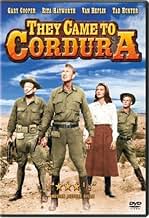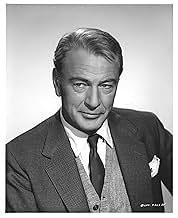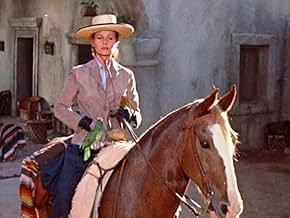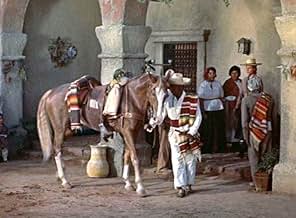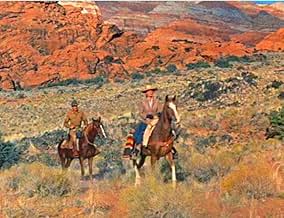Un maggiore dell'esercito, lui stesso colpevole di codardia, viene chiesto di raccomandare soldati per la Medaglia d'Onore del Congresso durante l'incursione al confine messicano del 1916.Un maggiore dell'esercito, lui stesso colpevole di codardia, viene chiesto di raccomandare soldati per la Medaglia d'Onore del Congresso durante l'incursione al confine messicano del 1916.Un maggiore dell'esercito, lui stesso colpevole di codardia, viene chiesto di raccomandare soldati per la Medaglia d'Onore del Congresso durante l'incursione al confine messicano del 1916.
- Regia
- Sceneggiatura
- Star
- Premi
- 1 vittoria e 1 candidatura in totale
- Capt. Paltz
- (as James Bannon)
- Cavalry Trooper
- (non citato nei titoli originali)
Recensioni in evidenza
What is courage? What is cowardice? This is the story of his search for an answer.
That summary is the opening text from this oddly {to me} divisive picture from Robert Rossen and Ivan Moffat. Divisive because there are conflicts about it's technical aspects, its length {which cut is original?}, it's talky nature, and if it's splendid cast did the material justice? Well the dispute about the technical aspects being poor certainly don't stand up to the version I saw of the picture, lovely widescreen CinemaScope with Burnett Guffey's photography astutely and rightly oppressive as the story unfolds. As for its length, the version I viewed was two hours long, is this a restored cut or is there still another half hour of Rossen footage lurking somewhere? Either way, the complaint about there being gaps in the film are not evident in this two hour cut. All characters are fully fleshed and every minute of this picture was engrossing and perpetually watchable. The cast are also on fine form, Gary Cooper is perfectly cast as Maj. Thomas Thorn, the man who's moment of weakness hangs heavy round his neck like a curse. Van Heflin, Rita Hayworth, Dick York, Richard Conte and Tab Hunter all help to make this a fine character driven piece.
Above all else it's the story that works the best, Thorn is carrying around a burden as he strives to take these heroes to safety and ensure they receive their medals of honour. But the perilous journey proves to alter each man's attributes, be it despicable or otherwise, something that to me personally makes this a thematically excellent picture, the kind we could do with more of in the modern era. It may well be cynical at times, but really that is no bad thing in my eyes, it's a cop out of sorts I know, but this film isn't for everyone. After a fine battle sequence has been and gone, the film shifts in tone and becomes a picture about the complexities of man and his own personal hang ups, the result of which left me very much rewarded. 8/10
After contact with the enemy, and after losing many men, five men were nominated for the Medal of Honor. Since the army needed living heroes to prepare the nation for its likely entry into WWI, Major Thomas Thorn (Gary Cooper), an awards officer, escorts the nominees, Lt. William Fowler (Tab Hunter), Sgt. John Chawk (Van Heflin), Cpl. Milo Trubee (Richard Conte), Pvt. Andrew Hetherington (Michael Callan), and Pvt. Renziehausen (Dick York), back to headquarters. This film is the story of that journey, and Thorn's exploration of the character of heroes.
Adelaide Geary (Rita Hayworth), an American woman who owns the ranch where the battle was fought, is sent back with them on charge of treason for aiding Villistas against American soldiers, even though she had no choice.
Although Hayworth and Cooper both gave impressive performances, Van Heflin was the standout as a brutish sergeant, especially since he was acting against type, having played decent men forced into heroism during his best-known films, Shane (1953) and 3:10 to Yuma (1957).
The flaws may be real, but they might not be the fault of the filmmaker (writer-director Robert Rossen).
Reportly, the film was taken out of Rossen's hands by the studio and drastically cut and re-cut. The director's original version, about 1/2 hour longer, was apparently much better, making much more dramatic sense.
Further, the movie was shot in CinemaScope, and comments on its poor cinematography and editing are likely based on viewing a crude pan & scan video copy. Such artificial flaws are common with panned & scanned widescreen movies.
.
Set in 1916, the film centres on a US military expedition deep into Mexico, a punitive response to Pancho Villa's raid on American territory. Gary Cooper plays Thorn, and though he invests his character with a certain quiet dignity, he can hardly be accused of acting.
Thorn is despatched back to the USA with a small group of men, each of whom is to be decorated for valour. As the Cavalry's Awards Officer, Thorn will have to prepare citations, and he obsessively quizzes the men about why they did what they did, how they felt at the time, and so forth.
Typically for a film of its era, "Cordura" assembles a melange of ethnic tokens, throws them into a difficult situation, then concentrates on the tensions and confrontations which result. Richard Conte is Truby, the crafty latin type, and Van Heflin plays Chawk, the angosaxon brute. Dick York is Renziehausen, the German American from (where else?) Wisconsin. Thorn is hoping to learn the secret of courage from his motley crew, but discovers that the answer to his question can only be found within himself.
Nice angles are developed to open out the plot's basic premise. A cavalry charge against the Mexicans looks like dashing American heroism, but might be no more than cynical fakery on the part of medal-hunting Colonel Rogers. Chawk might be an unfeeling ruffian rather than a hero. The arrival in the group of Mrs. geary (Rita Hayworth) complicates the issues, because the presence of a beautiful woman causes the men's interests to diverge.
The Mexican terrain is spectacular, and the film's central proposition is an interesting one, but the end product is so-so. It is difficult to warm to Cooper as an actor, or indeed to his character. Tab Hunter (as Lieutenant Fowler) goes way over the top. Thorn's sudden perking-up beside the rail track is a ludicrous event.
Verdict - Would-be essay on the wellsprings of human courage peters out into humdrum adventure yarn.
Lo sapevi?
- QuizAlthough Gary Cooper was 57, his character Major Thorn was forty years old according to the novel. Early in the film it is mentioned that Thorn's father had recently been killed while still on active service.
- BlooperMajor Thorn improperly salutes Colonel DeRose in the opening scene when he is dismissed. He should have saluted and held his salute until it was acknowledged. Instead, he lowers his arm even before Colonel Rose acknowledges it.
- Citazioni
Major Thomas Thorn: Did you ever see the Medal of Honor?
Private Renziehausen: No, Sir.
Major Thomas Thorn: It's the most beautiful decoration of all, as it should be. I'd trade an ear for one any time, two in fact.
Private Renziehausen: Excuse me, Sir, but I'd rather have the ear.
- Curiosità sui creditiOpening credits prologue:
On the night of March 8th, 1916, a large mounted force of Mexican rebels under Pancho Villa crossed the American Border and attacked the town of Columbus, New Mexico, killing and wounding both American civilians and soldiers.
As a result of this action,the United States Army sent an expedition into Mexico with orders to capture Villa and disperse his forces.
It was during this campaign that one man, an United States Army officer,was forced to come face to face with two of the great fundamental questions that affect mankind:
What Is Courage? What Is Cowardice?
This is the story of his search for an answer.
- ConnessioniFeatured in Stars of the Silver Screen: Rita Hayworth (2011)
I più visti
- How long is They Came to Cordura?Powered by Alexa
Dettagli
Botteghino
- Budget
- 4.000.000 USD (previsto)
- Tempo di esecuzione2 ore 3 minuti
- Colore
- Proporzioni
- 2.35 : 1
Contribuisci a questa pagina




